DAVE'S DIARY - 27 JUNE 2007 - PORTER WAGONER
PORTER WAGONER RETURNS TO RUBBER ROOM
"There's a man across the hall who sits staring at the floor/ and he thinks he's Hank Williams/ hear him singing through the door." - Committed To Parkview - John R Cash.
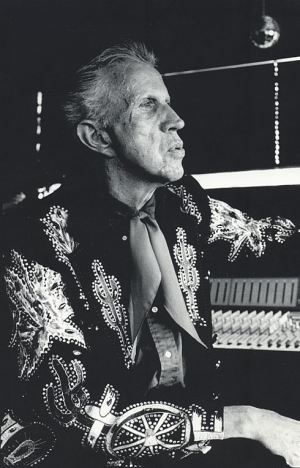 |
When
Porter Wagoner filmed a video clip in the historic Tennessee State
Prison he had flashbacks to a psychiatric hospital stint at the peak
of his career in 1965. The prison opened in 1831 and closed in 1989 but hosted The Green Mile movie and The Last Castle starring Robert Redford and James Gandolfini in 2001. The latter also featured singer-songwriter Dean Miller - son of the late legend Roger and former fiancé of Altona Meadows country singer Rene Stewart - in a cameo. But this year it was a backdrop for Wagoner's video of Johnny Cash song Committed To Parkview that adorned the debut Highwaymen disc in 1985. "The memories flooded back," Wagoner, now 79 and holding, told Nu Country TV while promoting his new album Wagonmaster on the Anti label, distributed here by Shock. |
"I was
in there for seven or eight weeks. I was stressed out. I was working over
200 days a year then - it was just too much for me. My doctor had me admitted.
I never made that mistake again. Johnny Cash had also been there and he
knew I had been there."
It's a sibling song of Wagoner's 1971 psychedelic epic Rubber Room
from his 27-year reign on RCA records from 1952.
He said Cash wrote Committed To Parkview for him and gave a tape
of it in 1981 to his son-in-law Marty Stuart who was then married to Cindy
Cash.
But Stuart, producer of Wagonmaster, misplaced the tape and The
Highwaymen beat Porter to the punch.
"He lost the song for at least four of five of those years,"
revealed Wagoner whose recording return was delayed by an abdominal aneurysm
on July 14, 2005.
Wagoner, who turns 80 on August 12, now jokes about the bedside manner
of the emergency-room doctor who told him that similar aneurysms killed
fellow country star Conway Twitty in 1993 and actor John Ritter a decade
later.
"I told Marty he needed to find the song - he kept looking until
he found it. It's a really good song, a typical Johnny Cash song. My worst
problem was trying not to sound like Cash."
FABULOUS SUPERLATIVES
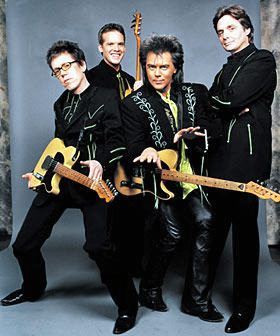 |
Stuart's
Fabulous Superlatives band back Wagoner on this album and appear
in the video. Willie fared much better on his Cindy Walker tribute album and trio disc with fellow Texan Ray Price, 82, and young Merle Haggard, 69. |
Wagoner's
support cast in the video for the Cash penned tune include Stuart and
his Fabulous Superlatives.
"A couple of girls I talked about in the song are also in the video,"
Wagoner added.
"Also the guy who played the doctor and the man who thought he was
Hank Williams singing though the door."
Committed To Parkview is the focus of the album that is reminiscent
of early concept discs Confessions Of A Broken Man and Soul
Of A Convict.
DOLLY PARTON
"With tear filled young eyes a young girl/ got on board at willow springs/ she was bearing child and I didn't see a ring/ "I'm on my way to Memphis", she said/ through trembling lips/ "at the unwed mothers' home I'll end my hurried southern trip." - My Many Hurried Southern Trips - Porter Wagoner-Dolly Parton
| Wagoner
also cut My Many Hurried Southern Trips - a narrative penned
with former duet partner Dolly Parton, now 61. "We wrote that song many years ago when we first got together," Porter added. "It was when she was a member of my show. It's a song about a bus driver taking a trip into history. In 1969 we added horns to Dolly's recording of Just Someone I Used To Know. Dolly and I wrote a lot of great songs together. Dolly and I were good. We know how to write songs. I know about it from her because she's great at it. Usually, I write alone. It's just good." |
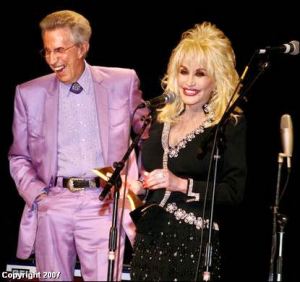 |
Wagoner says that when writing with others, "I have to get into your mind and deep thoughts of what you're writing about."
Wagoner is
justifiably proud of his risk taking.
"I liked to be an innovator because I didn't want to do the same
thing all over again. I kind of tried to stretch out occasionally when
I got a good idea."
This time Marty Stuart helped that aural elasticity.
"It's one of the finest albums of my entire career," Wagoner
confided.
"Marty did a brilliant job. He's a real good friend of mine, and
he's a real good producer. He's probably the best producer I've ever worked
with in my entire career.
To do an album something like that and something that's a little different
too. It's not a run of the mill album."
Dolly replaced Norma Jean in 1967 as Porter's partner on his 21 year long
syndicated TV show.
Porter and Dolly had 18 songs that charted between 1967 and 1980.
BUCK TRENT
It started
with Tom Paxton song, The Last Thing On My Mind, in 1967, their
only #1, Please Don't Stop Loving Me in 1974 to their last song
that charted, If You Go, I'll Follow You, in 1980.
The duo also released 13 duet albums that sold long after an acrimonious
legal battle that has long been patched up.
Porter, who landed 80 singles on the charts, recently celebrated 50 years
on the Grand Ole Opry with guests including Patty Loveless, Parton, Dwight
Yoakam and Stuart's Fabulous Superlatives.
The new disc also features long time Wagonmaster banjo player Buck Trent
who is honoured in the Marty Stuart song Buck And The Boys.
Other highlights include Albert Erving and Shawn Camp's rollicking Hotwired.
Wagoner also covers religious themes in Satan's River - a song
he first recorded in 1973 - and the spoken word Brother Harold Dee.
Brother Harold Dee is a song about triplets choosing different
paths - law, business and religion with the religious son being the outcast
until he comes to town after a six-year absence as a travelling preacher.
Wagoner is also happy about a collaborative revamp with Stuart of 1932
Bob Miller song Eleven Cent Cotton, Forty Cent Meat.
"Uncle Dave had done it years and years ago on the Opry," says
Wagoner.
"We had used bits and pieces of it."
CONNIE SMITH
 |
Ironically,
Stuart, now 48, is married to singer Connie Smith, 65, who competed
with Parton and the late Dottie West in auditions for Norma Jean's
role. "Yes, that's right Connie auditioned for the role," says Wagoner, youngest of five children born in the born in the Ozarks at West Plains, Missouri. Wagoner's TV show is still repeated on Nashville cable network RFD but it's not his only visual venture. He also appeared in Clint Eastwood movie Honkytonk Man during a stint on his Viva Label. |
"Yes, I did an album for Clint Eastwood and Snuff Garrett who was the producer on Viva," Wagoner revealed.
"We
did it in L.A. and it led to the movie role in Honky Tonk Man.
I performed This Cowboy's Hat and Turn The Pencil Over.
I didn't do any more movies - I didn't care for doing any other movies.
I did that one because I knew Clint and Snuff as I did the album for them."
But what about plans for a movie adaptation of Steve Eng's big selling
1993 Wagoner biography A Satisfied Man.
"There are no movie plans but it was a great book," Wagoner
confided.
"It was an honest account of my career."
PORTER RABBIT IN BUTCHER'S SHOP
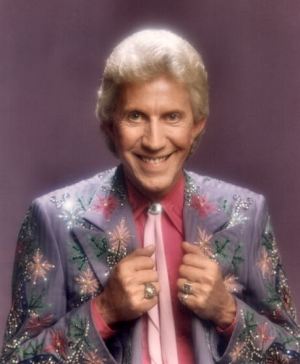 |
Wagoner's
career dates back to 1950 as a DJ on KWPM in West Plains before being
poached by KWPO in nearby Springfield where late Hollywood tailor
Nudie Cohen gave him the first of his 60 rhinestone suits. "We broadcast from the back room of a grocery store-butcher's shop," says Porter who left school after eighth grade. "I called myself Porter Rabbit because I bought my first $8 National guitar with my rabbit trapping money. The guitar is now in Marty's memorabilia exhibition with one of my rhinestone suits. My mother ordered that guitar for me, and I paid for it by trapping rabbits. |
I trapped
rabbits, sold pelts for a dime apiece - 15 cents apiece - once in a while,
when the market was good. We lived out in the country, and I'd meet the
mailman every day. Whatever rabbits I had trapped during that time I'd
sell them to him."
Wagoner, who broadcast from 5.30-5.45 am on his first radio stint, wed
the mother of his three children in 1946 and joined Blue Ridge Boys Band
who dabbled in bluegrass.
On his second radio stint - three shifts a day - his wages doubled from
$35 a week to $70 after he received so much fan mail it was kept in the
basement.
Wagoner eventually moved to Nashville where his 27-year RCA reign began
in 1952. His first single was Hank Williams' Settin' the Woods on Fire
in 1952 but neither that nor his next seven singles set the charts
on fire.
RCA dropped Wagoner in 1954 but he rebounded and recorded two songs with
his own money - his first two hits, Company's Comin in 1954 and
A Satisfied Mind.
RCA changed its mind and quickly re-signed Wagoner who released his first
gospel recording, What Would You Do (If Jesus Came to Your House).
Only one year later, Wagoner was invited to join the Grand Ole Opry and
relocated to Nashville.
He soon formed his backup band, The Wagonmasters.
Other hits included Misery Loves Company - a 1962 #1 - Green,
Green Grass of Home in 1965 and Bill Anderson's The Cold Hard Facts
of Life in 1967.
Wagoner is also renowned for his adventurous concept albums.
"I felt they (the concept albums) were ideas I needed to try,"
Wagoned recalled.
"I think they were very successful also because they sold a lot of
albums for me."
ALL GIRL BAND
Wagoner followed
in the slipstream of former convict and singing actor David Allan Coe
by working with an all-girl backing band in 1986.
"Yes, that was adventurous but it was not my biggest accomplishment,"
Wagoner quipped.
"At least I tried it to see how it worked. I was unhappy with the
band. When you get a bunch of women together - more than five or six you've
got a real problem on your hands. I'm being very honest and candid with
you."
Equally daring but more successful was his production of soul singer Joe
Simon and his introduction of another R & B legend James Brown to
the Grand Ole Opry.
"I thought he was one of the greatest showman I had seen in my life,"
Porter said of the controversial star.
"He did a great job that night at the Opry."
Wagoner's recording career has spanned six decades and was revived at
the start of the new millenium on Shell Point Records - the label run
by songwriters Larry Cordle and Larry Shell.
Missouri agrarian Damon Black sold his farm to finance recording of 14
of his songs for the 2000 Wagoner album The Best I've Ever Been.
"They were some of the finest songs I ever recorded," Porter
revealed.
"He was a brilliant writer. I understand it's true that he sold his
farm to concentrate on his writing."
Another acclaimed Shell Point album Unplugged followed in 2002
midst a flood of compilations.
The cream of these was the 2006 Australian concept disc The Rubber
Room - The Haunting, Poetic Songs Of Porter Wagoner 1966-1977.
The review is below.
TREE OWLS
| Wagoner,
who has also released several recent gospel albums, has vivid memories
of his roaring days of old. "Yes, I used to howl," Wagoner said. "I used to get out and roar with guys like Mel Tillis, Johnny Cash, Carl Smith, Merle Kilgore, and Merle Haggard when he was in town." Wagoner recalled joining up with a colourful diet pill-popping posse including Cash and Kilgore. On one occasion the men went on a mission to buy junk food and give it to their long departed friend Johnny Horton, who died in a 1960 car wreck but whom Kilgore claimed had been reincarnated in the form of a just-born colt on Carl Smith's farm. |
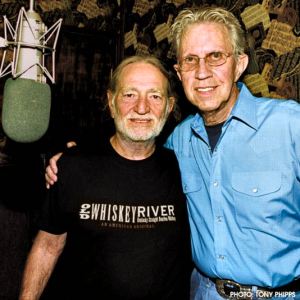 |
The story
ended with a shotgun wielded by Smith (a former husband of June Carter
Cash) aimed squarely at his buddies, who were excitedly attempting to
explain about Horton's miraculous rebirth.
"All these guys were taking these pills, man, and they had these
big eyes," Wagoner said.
"They looked like a tree full of young owls. Carl just finally turned
around and left."
It was a different saga to that of Wagoner and another fellow singer-songwriter.
Although Porter left Missouri more than 50 years ago he's connected because
of links with singer Jan Howard - one of the late songwriter Harlan Howard's
six wives.
"I still receive newspaper clippings about accidents at the corner
of Porter Wagoner Boulevard and Jan Howard Avenue in West Plains,"
Porter revealed.
"That's kind of nice."
2006 PORTER WAGONER CD REVIEW
PORTER - FROM WOMB TO RUBBER ROOM
"In a buildin' tall with a stone wall around there's a rubber room/ when a man sees things and hears sounds that's not there/ he's headed for the rubber room/ illusions in a twisted mind to save from self-destruction hmm it's the rubber room." - Rubber Room Porter Wagoner.
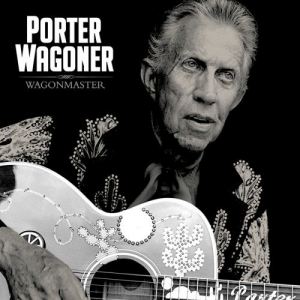 |
It
was not a rubber room but a Nashville hospital ward that almost became
a tomb for country icon Porter Wagoner on July 14, 2005. But he survived an abdominal aortic aneurysm to celebrate his 78th birthday - August 12. Now, with much help from indie Melbourne record label boss and PBS-FM DJ David Thrussell, the royalties' wagon train rolls again for Porter. Thrussell has released 29-song compilation The Rubber Room - The Haunting, Poetic Songs Of Porter Wagoner 1966-1977 (Omni). |
His career started in the forties with bluegrass band Blue Ridge Boys, a brace of hits, 13 duet albums with Dolly Parton, a gospel rebirth and two albums in 2000 and 2002 for Shell Point Records.
Wagoner was
renowned for rhinestone suits and TV show that launched Dolly but this
digs deep into darker songs from the curio crypt.
And the singer's sequins shine in the sequencing with eight Parton originals
including entrée Out Of The Silence (Came A Song) and duet
on The Party segueing into finale Moments Of Meditation.
Wagoner sets a morose mood by milking melancholia from Parton's suicide
antidote and sibling to The Rubber Room.
But Porter, born of Irish-German heritage in the Ozarks of Missouri near
the Arkansas border, breaks the mould in personalised narratives George
Leroy Chickashea - tale of a murderer with no race or creed - and
summary justice death of evil stepfather Jim Johnson.
BOBBY AND LAURIE
Death is
a staple in the wry Bones, The Carroll County Accident, a hit for
Bobby & Laurie, Bill Anderson's First Mrs Jones and Indian
Creek.
And cheating in Woman Hungry, Crumbs From Another Man's Table and
Anderson's Cold Hard Facts Of Life results in death of the wife
and lover.
It grows to three in Waylon Jennings Julie - a murder suicide -
with that other staple drinking in Wagoner-Parton tune Wino and
Faron Young's The Bottom Of The Bottle.
Innocent children, victims of the most maudlin songs of the genre, are
the sting in the tail - Little Boy's Prayer, My Last Two Tens and
Parton-Porter duet on pathos primed original The Party.
The parents resist pleas by children to take them to a party but return
early to find fire has claimed them.
Thrussell captures an era destined to die with Porter whose concept discs
What Ain't To Be Just Might Happen and The Cold, Hard Facts
of Life were ahead of their time.
"I stand in awe of Porter," Buddy Miller says, "I think
of him as a visionary."
Wagoner, who landed a role in Clint Eastwood movie Honkytonk Man,
agrees.
"My biggest accomplishments tend to get overlooked. I always thought
you owe it to yourself to stretch out once in a while and do something
dangerous," says Porter who wrote new songs for his 2004 and 2005
gospel discs.
"Rubber Room was off the wall, but Chet Atkins told me it
was the most creative song I'd ever done. Every now and then you've got
to rattle the cage a little."
He did it in 2000 when he released The Best I've Ever Been - Missouri
farmer Damon Black wrote the songs for Porter after selling his farm.